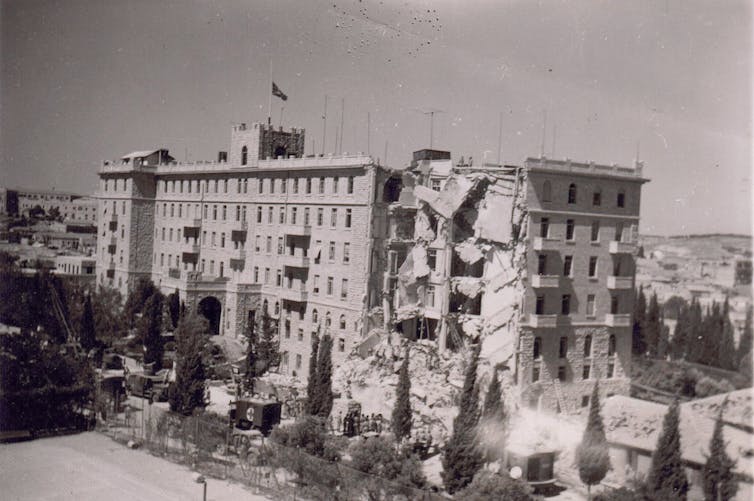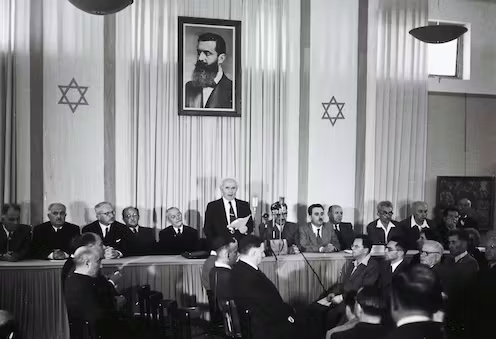Before they were Israeli, the Jewish community of Palestine – the Yishuv – had been Britain’s close junior partner. A dispute over Britain’s restrictions on Jewish immigration to Palestine began in 1939, but was set aside during the struggle to defeat Hitler.
In a white paper that year, the British government declared the “Jewish National Home”, as promised in its 1917 Balfour Declaration, as a settled policy. It planned to replace direct rule with a democratic government for all. These plans never matured, because of the war and because of both Palestinian and Zionist resistance to them.
Zionist institutions supported Britain’s war effort against a common existential enemy but their frustration boiled over once it was finished. The monthly quota of 1,500 Jewish immigrants was seen by the Yishuv as complicit with Hitler’s near-complete genocide. There would be no further compromise on this issue.
After decades of close security and counter-terrorism cooperation – and wartime cooperation in covert action, propaganda, economic warfare, signalling, and other elements of intelligence work – the Zionist leader and future prime minister of Israel, David Ben-Gurion, launched a secret war on Britain.
Previously, the large Jewish militia in Palestine, known as Haganah or “defence”, had served as an auxiliary to the British police and army. Its intelligence service, called Sherut Hayediot or Shay, had supported Britain in the war effort and cooperated in the suppression of anti-British Zionist terrorism led by two other future prime ministers: Menachem Begin and Yitzhak Shamir.
When Ben-Gurion learned from a source in the cabinet that Britain would prevent European Jewish survivors from entering Palestine, he authorised secret cooperation between Haganah and the two terrorist groups: Begin’s Irgun and Shamir’s Lehi, also known as the “Stern Gang”.
Britain knew about these orders to cooperate thanks to its signals intelligence service (today’s GCHQ). But intelligence officers struggled to interpret these messages.
Even when intelligence was accurately understood, it was difficult to act upon without alerting Haganah that its codes were insecure. GCHQ relied on a small cell, including future historian Bernard Lewis and another British Jew, Samuel Stalbow, to handle intelligence. They never leaked Britain’s top secret intelligence, unlike – as we shall see – the British government itself.
British missteps
After months of bombings, kidnappings, and murder, the high commissioner for Palestine, Alan Cunningham, was finally authorised to act. So the British army planned to arrest the leadership of the Jewish Agency (the main representative body of the Yishuv, led by Ben-Gurion).
Often described by British authorities as an imperium in imperio, or a “state within a state”, the Jewish Agency’s relationship with armed groups was more complicated than the British had realised.
On June 29 1946, the army and police launched Operation Agatha, arresting most of the Jewish Agency and some of Haganah’s strike force. Its chain of command remained intact thanks to warnings from its own intelligence, allowing some to hide or escape.
Ben-Gurion had been in Paris. This moment was the climax of his five-year strategy to sever Zionism’s dependence on Britain, thus far a pillar of the movement’s approach to colonisation.
Operation Agatha forced the Jewish Agency and the Zionist movement to consider next steps: what did they want from this struggle? Ben-Gurion’s drive for independence was the only viable answer available.
King David Hotel bombing
Then, in what GCHQ historian John Ferris called an act which “finalised the Anglo-Zionist divorce”, on July 22 Irgun terrorists bombed the British headquarters at the King David Hotel in Jerusalem, killing more than 90 people, including GCHQ and other intelligence personnel.

Devastation: Britain’s headquarters in Palestine, the King David Hotel, was bombed in 1946 with the loss of 90 lives. Gordon Trevor Moore
Deceptive intelligence, disseminated by none other than Kim Philby – later unmasked as a senior Soviet agent – sent Palestine’s top security and police officers to Beirut. Britain’s poor security at its headquarters was thus compounded by the absence of those meant to interpret warning intelligence. Terrorism destroyed part of Britain’s top secret intelligence unit and its grip on the intelligence picture weakened.
The arrests in June had created a constitutional complication. By closing the Jewish Agency, British opposition MPs and some government backbenchers argued, the army had threatened the legitimacy of British rule at least as much as Jewish terrorism.
Having confiscated Jewish Agency records, Britain hoped to present such evidence without blowing GCHQ’s sources. Although the material illuminated Jewish Agency complicity in terrorism, and a wider pattern of theft of arms and intelligence, it was not enough to prove that Ben-Gurion ordered Haganah’s resort to terrorism.
In response to parliamentary pressure, and against the advice of military and intelligence authorities, the prime minister pressured the security service MI5 to prepare a paper for parliament that included decrypted communications of Ben-Gurion, the head of Haganah and other officials. The aim was to embarrass those leaders, spurring their cooperation, but also to settle parliamentary outrage.
After these intelligence leaks, the Jewish Agency and Haganah updated and professionalised their cryptography, meaning Britain lost access to vital intelligence.
During 1947 – a critical year – Britain struggled to regain this access within the Jewish resistance. The British government also tried to bring Jews and Arabs back to negotiations, but failed to get official Jewish Agency participation.
End of the Mandate
In January, Britain referred the Palestine question to the newly formed United Nations, and was surprised when the UN recommended ending British rule and the creation of an independent Jewish state. The leaders of this new Jewish state had learned from Britain’s intelligence mistakes, as well as its own.
More significantly, by late 1947, Haganah began to attack the encyrption used by surrounding Arab states and their armies, especially the volunteer Arab Liberation Army. Israel’s ability to locate its enemies and understand their intentions and capabilities contributed to its many tactical advantages during its 1948 war for independence.
The Israeli experience in signals intelligence – drawn from wartime cooperation with Britain and the post-war anti-British struggle – proved vital to the emergence of Israel, and its enduring legacy as an intelligence powerhouse.



 Trump Signs “America First Arms Transfer Strategy” to Prioritize U.S. Weapons Sales
Trump Signs “America First Arms Transfer Strategy” to Prioritize U.S. Weapons Sales  Trump Allows Commercial Fishing in Protected New England Waters
Trump Allows Commercial Fishing in Protected New England Waters  Marco Rubio Steps Down as Acting U.S. Archivist Amid Federal Law Limits
Marco Rubio Steps Down as Acting U.S. Archivist Amid Federal Law Limits  Trump Allegedly Sought Airport, Penn Station Renaming in Exchange for Hudson River Tunnel Funding
Trump Allegedly Sought Airport, Penn Station Renaming in Exchange for Hudson River Tunnel Funding  BTC Flat at $89,300 Despite $1.02B ETF Exodus — Buy the Dip Toward $107K?
BTC Flat at $89,300 Despite $1.02B ETF Exodus — Buy the Dip Toward $107K?  UAE Plans Temporary Housing Complex for Displaced Palestinians in Southern Gaza
UAE Plans Temporary Housing Complex for Displaced Palestinians in Southern Gaza  Trump Rejects Putin’s New START Extension Offer, Raising Fears of a New Nuclear Arms Race
Trump Rejects Putin’s New START Extension Offer, Raising Fears of a New Nuclear Arms Race  TrumpRx Website Launches to Offer Discounted Prescription Drugs for Cash-Paying Americans
TrumpRx Website Launches to Offer Discounted Prescription Drugs for Cash-Paying Americans  U.S.-India Trade Framework Signals Major Shift in Tariffs, Energy, and Supply Chains
U.S.-India Trade Framework Signals Major Shift in Tariffs, Energy, and Supply Chains  Trump Lifts 25% Tariff on Indian Goods in Strategic U.S.–India Trade and Energy Deal
Trump Lifts 25% Tariff on Indian Goods in Strategic U.S.–India Trade and Energy Deal  U.S. Sanctions on Russia Could Expand as Ukraine Peace Talks Continue, Says Treasury Secretary Bessent
U.S. Sanctions on Russia Could Expand as Ukraine Peace Talks Continue, Says Treasury Secretary Bessent  U.S. Lawmakers to Review Unredacted Jeffrey Epstein DOJ Files Starting Monday
U.S. Lawmakers to Review Unredacted Jeffrey Epstein DOJ Files Starting Monday 






























